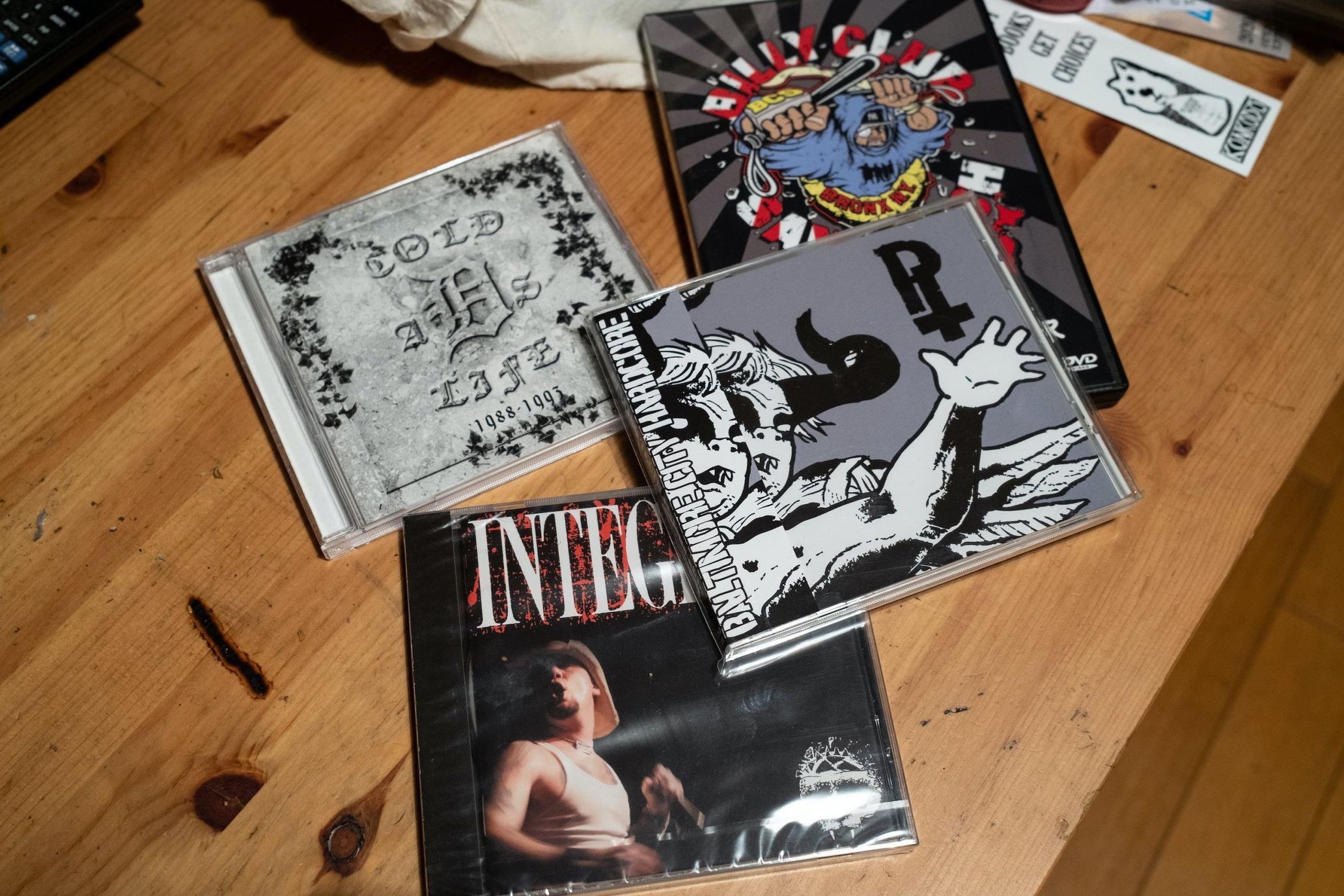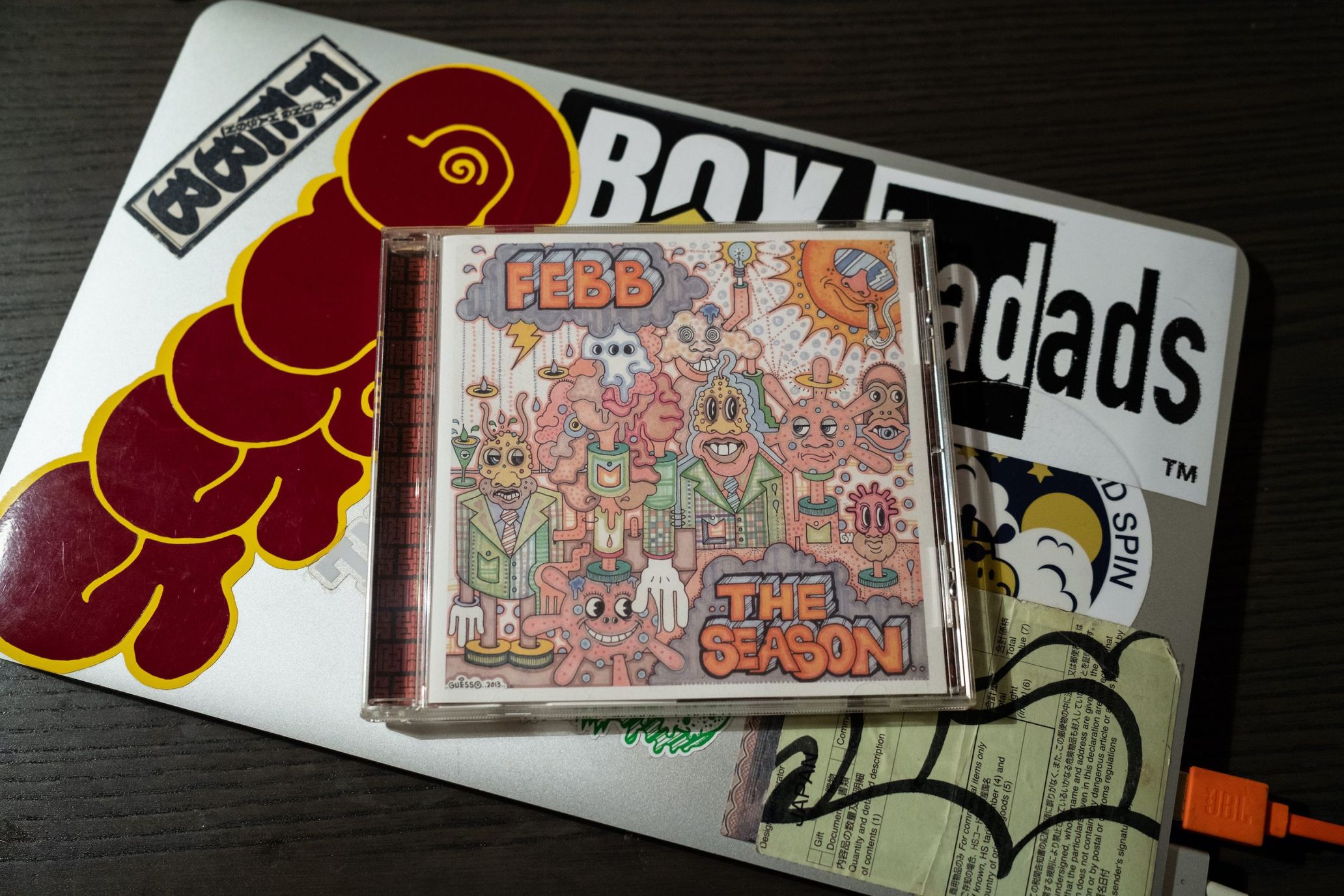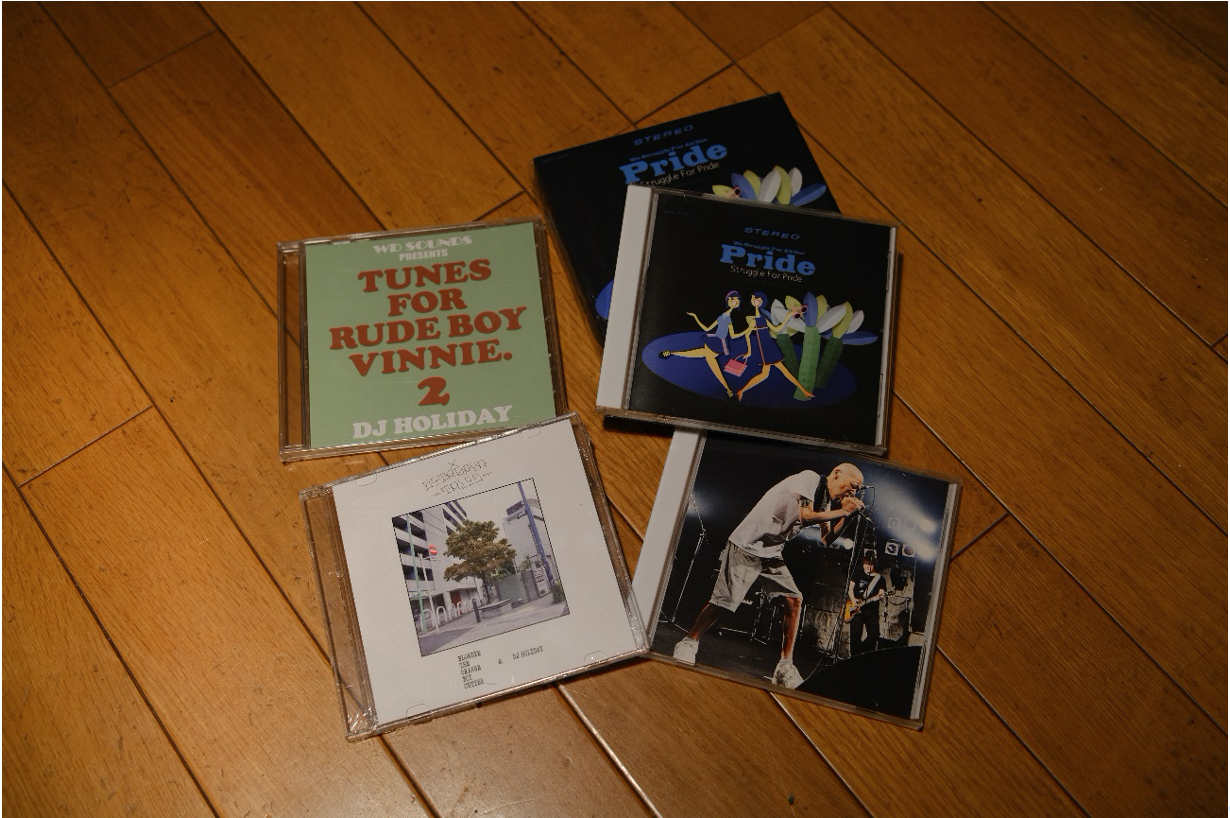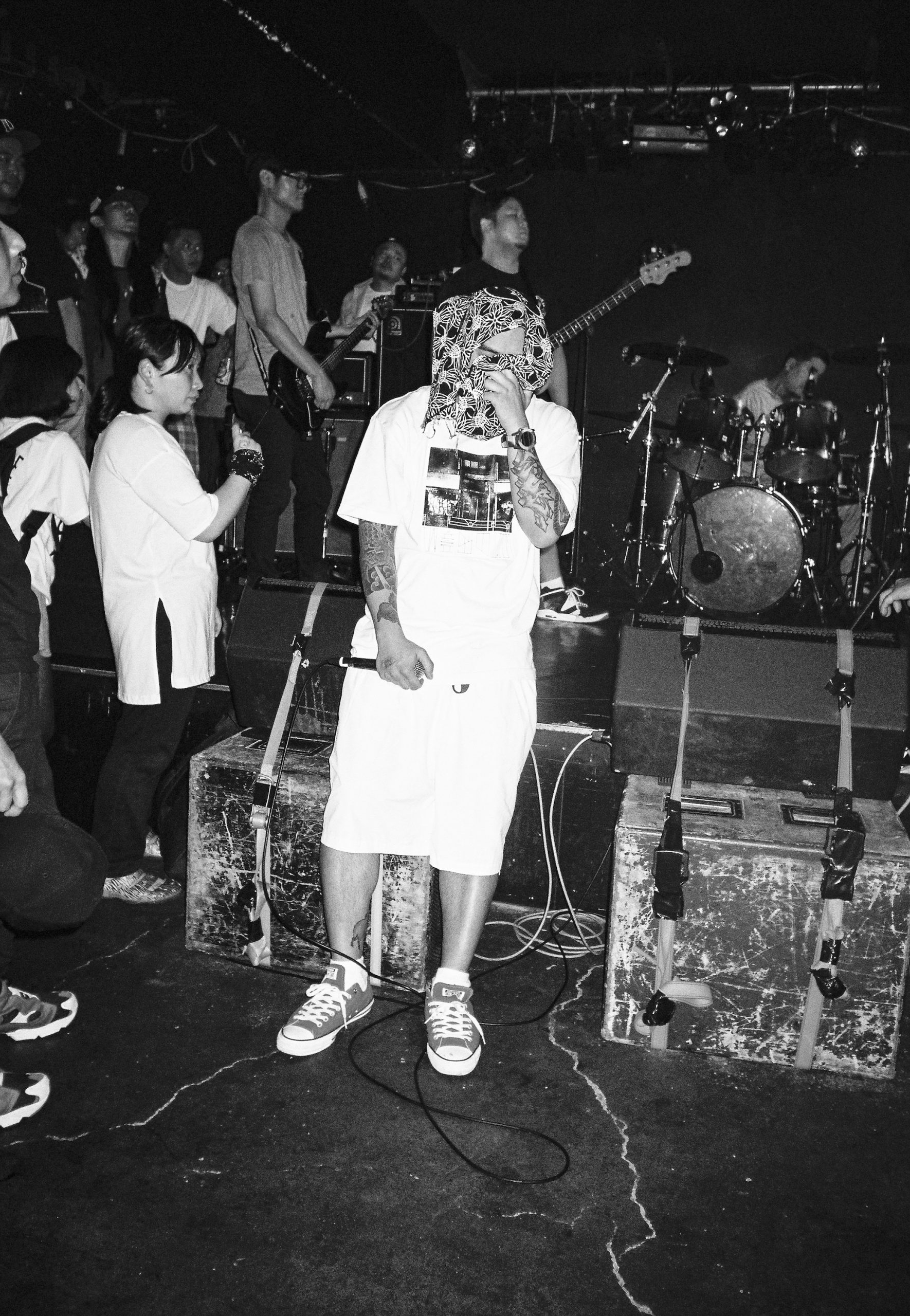WDsounds is a record label that has been leading Tokyo’s both hardcore and hip-hop underground scenes for more than a decade. We interviewed the owner of the label, Masashi Sawada. What are the thoughts born in the man known to have a hands-on approach, from experiencing the novel coronavirus pandemic? For the second half of the interview, we question the meaning of releasing records.
Counteract towards internet and coronavirus
Masashi Sawada: “Becoming a routine” could also be said with the way we put out information—We usually send out information to get published on news sites and web magazines, but a while ago, I was talking with a person and we were saying, “isn’t it going to be a counter effect having the same news on a lot of different platforms?” I feel like it’s going to make the readers not care about it. It’s kind of like we’re getting buried under other pieces of information. I’m well aware that not all readers read everything on magazines, and I don’t care where our information gets published, but when it’s online, the important matters could get buried or overlooked, since people can get access to all sorts of information.
――I feel you. The quality of information dwindles
Sawada: Relating to our conversation earlier about the store, in the old days, we would send out CDs along with a release, talk to the media over the phone, and if we hit it off well, we would set up an interview—that was the general flow. But since the internet became the main domain, interview articles became indistinguishable from one another. These interviews are supposed to be for promotion, but I’m getting skeptical about it. I think one is good enough to trigger attention.
――I guess this is all about the pros and cons of the internet taking away the meticulous efforts….
Sawada: Well, essentially, we were working mainly on site, but when that became impossible since the outbreak of Covid, internet gave us the potential to continue expressing ourselves. But back to our conversation about CDs, it’s undeniable that CDs consist of a massive amount of information. And it’s the same with mixtapes. They function like the media; you can acquire information such as the artist’s personal relationships or see who they are connected to. Recently, I started buying and listening to CDs again, and check out the covers just the way I used to in the old days. With hardcore, some artists only put summarized contents of their lyrics, and I find it interesting.
――I see. I hope we can let more people know that CDs are worth buying as they are fun and entertaining. I understand subscription services are easy but relying on them too much can weaken the quality of listening to music, cause more ‘nibbling,’ and as you were saying earlier, increase the risk of important things getting buried.
Sawada: Especially in specialty stores, the store owners decide what to carry in their stores and write reviews about them—and they’re fun to see. These reviews spark our interest in listening to their selections. Their store lineups can also be found on subscriptions, but you can’t get that excitement of saving the fun for later until the records are delivered to your home. I think I’m able to enjoy that process more these days, as I’m not so swamped and have more time now.
――I think it goes without saying for those who like records, but I get hyped like a kid when I get records with surprises like detailed sleeves and colored vinyl.
Sawada: You can find out some tidbits from hearing people talk. Originally, I wasn’t that interested in the stuff I’m into now, but like what I said earlier, when I was hanging out with other guys and hearing them talk, they’ve made me curious and want to be involved in their conversations. They seemed so lively when they were having those talks. Obviously, these aren’t vital for us like food, and we’re not going to die without them. But they bring joy and make us feel alive.
Most things are possible if you try
――As you mentioned about CDs couple times so far, from here on, I would like for you to pick up some CDs or releases from WD’s catalogue, and have you talk about them.
Sawada: I tried to narrow down but there’s quite a lot (laugh). I can sort them out in different categories, though.
Sawada: Regarding this (=SALVATION MALEVOLENCE,) we were initially planning on releasing a different title, but it didn’t happen as we couldn’t get in contact with the band members. Later, when I went to the states, in Baltimore, my friend took me to that band’s show; there I met this guy name Don [Romeo] from Pulling Teeth, and he asked me if I was interested in putting out Integrity’s CD. The PN of this title is ‘002’; ‘000’ is for my former band and ‘001’ was supposed to be for the split album of Next Step Up and DSL from Tokyo, but it didn’t happen, so technically, SALVATION MALEVOLENCE is WD’s first-ever release. Pulling Teeth is fairly a new band, but they’ve made me realize that I can get along with US hardcore bands that I’ve admired from before.
Especially, the re-release of Cold As Life’s demo (=1988-1993 DISCOGRAPHY) is deeply memorable to me. They’re my favorite band since high school, and only my elders owned the essential copies. Back then, I remember well borrowing and burning the record onto CD-R, but I didn’t think I’d be distributing my coveted records, officially, from my own label. It’s a bit funny to me, though. It’s not like I’m trying to represent the scene, I’m just a listener, who merely likes listening to those bands, and I’m on cloud nine being able to help those who’ve been inspiring me. These lineups are pretty much based on my predilection, but I just want the listeners to know about the ones we put out there.
Actually, quite a lot of people think we’re completely a hip hop label. Or some people don’t even know that I’m in a band. This (=JAPAN SUSPECT TOUR) is a DVD that documents the band’s Japan tour, and it’s also released in the states and in Europe; WD does its distribution in Japan. I joined the tour from the beginning to the end, so gratefully, whenever I’m in the states, they’d invite me to their homes, and we’d hang out together—I feel like I’ve learned a lot through releasing records and interacting with these bands.
Sawada: Next is FEBB’s THE SEASON. This release has given a huge impact on me. I even thought that I would never be able to create something better than this piece. So, in the past, I wasn’t happy with people complimenting this album—because, as a record label, we need to keep updating with more great works. It took over a year producing this record with P-VINE, and it was my first time working with an ample budget.I flew all the way to New York to commission Chance Load for the cover art, and directly asked Ken Sport (beat maker who lives in New York) to do a track. In fact, FEBB and I went through credits of different CDs looking for engineers to work with. Mixing was done by the same person, who did Curren$y’s first and second record. We were browsing through credits saying, “this dude might be lit,” and contacted these engineers, dubiously. Also, we had a concept of making the inside cover almost like an art gallery and asked the artist to create art in each page based on the theme, FEBB’s “THE SEASON.” I think I was able to grow through that experience. If you tell yourself that it’s not going to work out, then it’s going to turn into defeat, and most things are possible if you try—this is what I learned from the album.
Sawada: STRUGGLE FOR PRIDE’s album was produced in conjunction with Space Shower. I’m proud of the WD logo imprinted on the record. It is consisting of two discs in compiled format; I really like records of reggae and oldies that come in a set of two or three discs, so I made it conceiving that excitement. I think another fun part of a CD is that you can fire up your imagination. DJ HOLIDAY’s SETAGAYA TALES is made from a track list that was written in a letter I received from Imazato. He told me that he had selected out of the records in his record bag.
Sawada: voice was an album that SENNINSHO made from my relentless request telling him that he needs to put out another album. The second album, BOY MEETS WORLD (again released from WD) was a straight-up hip-hop album, but on the other hand, voice has a wide variety of sounds, and in that sense, I think it fits WD’s style. After voice was released, I joined the tour with SENNINSHO, and went more than twenty different locations; also, we did a release party at Liquid Room for the first time. We just wanted to try different things. SENNINSHO is loved by everyone, and respected as a rapper, so we had to make sure we prepare the coolest set for him to live up to those expectations. However, the tour was a living hell [laughs]. We were psyched to say ‘tour life’ only in the beginning. The entire time on the road, I was thinking about all the stuff I had to do when I’m back in Tokyo. Though, I’ve got to admit, I was chilling in the backseat of the car, making my friend drive (laugh)—so, I had a blast. There’s a person, who works as a PR, named Aki, who I look up to and takes great care of me, and he lend us NIXON’s hi-ace van saying, “just wanted to support for the tour.” Now that I think about it, it was an insanely cool tour.
――When was the tour?
Sawada: About half a year ago. We started in February and ended in the very beginning of September—I remember we were planning to finish the tour by the end of August. We learned our lesson and for the BOY MEETS WORLD tour, we’d limited to four locations, and performed during daytime instead of performing late at night. We actually got feedbacks from young kids, saying it’s harder for them to go out to clubs at night, and they prefer us performing during daytime.
――Right when BOY MEETS WORLD was released, SENNINSHO’s headshot was boldly used for the cover of Ollie magazine—I remember it was getting major attention.
Sawada: That photo was actually taken when we shot the cover for BOY MEETS WORLD. We told the crew we wanted to take the photo for the album cover as well. The photo and design on the cover of the analogue record is slightly different from the one on the CD. And the cover of the remix version is an illustration. We contrived to make them collectible. I think ERA’s album is with the most elaborated design—It’s a three panel Digipak featuring artwork by graffiti artist QP. The unit cost became exorbitant, and even though it’s sold quite a lot, the more it’s sold the more we’re in the red [laughs]. In spite of it all, we wanted people to own one. In fact, it’s not selling so well digitally, which means, most listeners have the physical version.
Being lively, getting off track, community, support, action, and reaction
Sawada: I think there’s more meaning to releasing records. You see, artists are humans, too. And I think that’s what’s intriguing. Because they’re humans, they get lost at times, but if you see the entire picture, those times are worth it. Even if they get off track that doesn’t necessarily mean their work is a failure; in fact, no matter what, record labels are there to support and release their creations, and I think that’s incredible. I work closely with the community, so when FEBB was anguishing and getting lost, although his work (second solo album SO SOPHISTICATED) wasn’t released from WD, I still gave him advice like, “you might wanna talk to ULTRA-VYBE.”
Sawada: It’s not like I’ve got power running the label—it’s an independent label, so we can’t get different things done all at once. So, I once introduced FEBB to Space Shower (for his joint album with GRANDIS NICE, L.O.C -Talkin’ About Money-.) I don’t know if this is the right way to put it, but he was able to carry out ‘till the end because everyone was there to lend him support. He was able to release his music with help from these people behind the scenes. Communities, support, activities including gigs, fans, and responses from listeners—these are the things that keep artists going.
――Jazzmen from the old times tend to get glorified, but if you read or hear stories about them, most of them are actually assholes.
Sawada: I agree. It’s fun saying it’s shit to shitty stuff when it’s still around. You don’t need to make stuff that are understood and liked by everyone; everyone has their own reason in creating things, and it’s cooler when we can see each of their distinctive signature in their works. In order for the artists to create and put out their bona fide feats, they need to have the right team that can work closely with them.
――I can absolutely feel that from FEBB’s second album.
Sawada: But he really sucked before recording that album. The second album was like a rehab for his rapping, and it actually sounds pretty good if you see it that way. When I was talking to SAC (beat maker of SCARS), who did the remix of SO SOPHISTICATED, he was also saying that FEBB sucked.
―― (laugh).
Sawada: It’s true, FEBB sucked, but I’d never gave up on him. I’ve had times where I thought I wouldn’t be able to help him when he’d asked me over the phone, but I stood by him anyway. I think the background of that time is refelcted in the “inside” of his CD—from the vibe and artists in the pictures. I’ve had times where I had a strong urge to rise in the world and wanted as many people as possible to hear my kind of music, but I didn’t “want people to just listen,” and thought there should be a better way to present it. Also, I don’t want to handle the type of music that gets played poorly. It might sound blunt, but I don’t want trash. So, instead of widening the range, I want to be more particular as it makes more sense to me that way. I think we want people to buy CDs because they expand possibilities. It is said that, in general, CD sales are plummeting, but if we find out that it’s doing well in one spot, we can attract people’s attentions from there; we were reminded that we should make something more robust—From all that we’ve been through.
Masashi Sawada
Born in 1979. While he owns a record label, WDsounds, he takes part in producing records of artists including SENNINSHO, FEBB, CAMPANELLA, and ERA; he is a rapper himself under the alias J.COLUMBUS. He is also a lead singer of the hardcore punk band, PAY BACK BOYS. A member of the readers collective, Riverside Reading Club.
http://wdsounds.jp
Photography Teppei Hori






